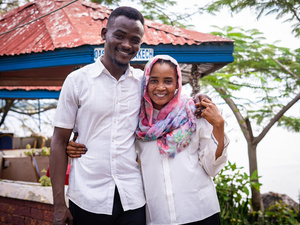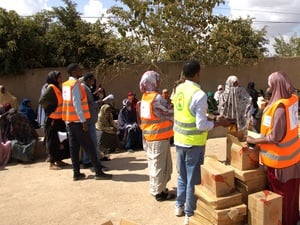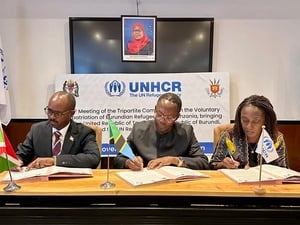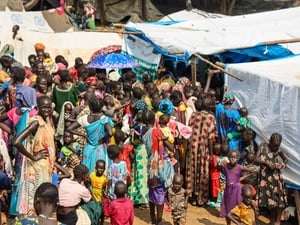UNHCR staff climb Africa’s highest mountain in support of refugee children in Tanzania
UNHCR staff climb Africa’s highest mountain in support of refugee children in Tanzania

Two of the three UNHCR staff who climbed Mount Kilimanjaro to raise funds that will help install lighting arrestors in 10 schools in refugee camps in Tanzania.
Three aid workers with UNHCR, the UN Refugee Agency, in Tanzania have climbed Mt. Kilimanjaro, Africa’s highest mountain, in support of schools within the refugee camps in Tanzania. The journey took six days with the final leg of the climb starting at midnight and ending at sunrise at 5,895 meters above sea level.
With the raised funds, 10 schools will receive much-needed lightning arrestors and protect refugee children from catastrophic lightning incidents.
Heavier than normal rains and thunderstorms have led to fatal lightning incidents in Tanzania, particularly impacting refugees. In just one month alone in 2023, lightning hit a school in the Nduta refugee camp and instantly killed five children while injuring another 15 children. A nine-month-old refugee baby had to undergo lifesaving treatment after being similarly struck in a separate incident, while another refugee child was left with multiple burns most recently in December.
“When the fundraising idea came up it was about us climbers highlighting the needs of the refugees in Tanzania figuratively from the highest point possible and translating the adventure and toil of the climb to mobilizing resources for those that UNHCR serves, especially children,” explained Murithi M’nkubitu, one of the climbers.
Despite the beautiful views of the mountain, the UNHCR team was constantly reminded of the reality of many refugee camps and the areas they live in. For Damla Balaban, also part of the climbing team, this was crucial in motivating them throughout their journey.
“It was dark, cold, and we were sleepless and hungry. The climb to the top was physically challenging, but I didn’t have any room to doubt if I was able to do it or not, I had to do it. There was no option for stopping, because we were climbing to fundraise for refugee children to be safe,” said Damla.
“Thinking about those refugee children who are affected by the lightning has motivated me to keep on going, keep on moving, and never give up. The climb to the top of Mt. Kilimanjaro was especially challenging for me – while going higher and higher, oxygen was decreasing, and I had difficulty in breathing,” added Yajun Hu.
Climate change continues to impact both displaced populations and the communities that are hosting them. In recent decades, the Kigoma region in northwestern Tanzania and where the two main refugee camps are located– has grappled with severe weather events such as heat waves, floods, and storms.
Out of a total of 56 schools in the refugee camps in Tanzania, 46 do not have lightning arrestors. The fear of encountering further lightning incidents is a daunting reality for many refugees and asylum seekers as the Tanzania Meteorological Authority has predicted more heavy rains and storms in the coming months. It costs just USD 1,700 to install one lightning arrestor in a school, which can save the lives of around 1,500 refugee children.
“We need to move with speed on the installation of lightning arrestors to safeguard the lives of the people we serve. Having the lightning arrestors will mitigate the risks of death of refugees, especially children, which is an avoidable tragedy if we act now,” said George Kuchio, UNHCR’s Deputy Representative for Protection in Tanzania.
Tanzania currently hosts over 240,000 refugees, mainly from Burundi and the Democratic Republic of Congo, more than half of them being children.
As of 15 December 2023, UNHCR had received only 37 per cent of the resources needed to assist and protect refugees in the country. UNHCR appeals to the international community to support the refugee response, especially to raise funds for lightning arrestors in refugee schools. One refugee child dead from a lightning strike at a school, is one too many.
More information on how to donate available here.
END
For additional information:
- In Dar es Salaam, Bahia Egeh, [email protected], +255 765 168 179
- In Nairobi, Faith Kasina, [email protected], +254113427094









